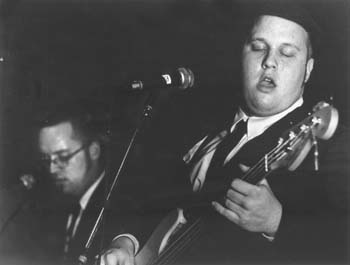
Robert Scheer
Pick It Up: Monkey's keyboardist, Curtis Meacham (left), and bassist Kevin Miller merge Latin and Jamaican rhythms on the band's new CD, ¡Changito!
Local ska outfit Monkey digs deep for roots
FRIDAY NIGHTS at Cupertino's Coffee Society aren't what they used to be. Back when going to a bookstore and a cafe took separate trips, the Coffee Society nurtured a gentle Bohemian roar. As America's love affair with Starbucks has blossomed, the Coffee Society has been reduced to Coffee Subculture, the crowds sucked away one frappuccino at a time.
Coffee Society is also Monkey's unofficial board room. It's where the eight members meet and iron out band business. In its own way, Monkey understands the plight of the old-school flame keepers--in caffeine as in music. As the South Bay's premier purveyor of traditional ska, Monkey reveres the grand champions of the Jamaican precursor to reggae. It should. Monkey, which has just released a new album, ¡Changito!, is a living testament to the musical legacy of the Skatalites, Prince Buster and the Specials, as well as non-ska monuments like Tito Puente.
"Just to know that [Skatalites saxophonist] Roland Alphonso played on our album--wow!" raves Monkey guitarist Adam Brioza. "He blessed the album. He said the music gave 'heem a keek.' We give him utmost respect."
Respect. It's about paying tribute to those who deserve it. During our interview, Brioza, bassist Kevin Miller and keyboardist Curtis Meacham spend half the tape giving props to the Skatalites, Unsteady, Mobtown, Skankin' Pickle, Jump With Joey, Yeska, Cee-spot, Hepcat, Toots, Bob Marley, Tito Puente and even local promoter Eric Fanale and his folks--all with lustful ardor. They go on about this one's live show, that one's work ethic, the generosity of these people, the originality of this approach.
When they got together in July 1995, Brioza, Miller and Meacham surveyed the local ska landscape and saw the lack of bands versed in the traditional style. Ska-punk was the style of choice. "We looked at the market and saw there were so many up-and-coming punk-ska bands that within the next couple of years, it'll be almost worthless," says Meacham.
Getting everyone on the same page in the ever-changing ska world was difficult. Monkey had trouble keeping horn players; Brioza estimates 13 people passed through the ranks over the years. The band is currently settled on Bobby Miller (alto), Dustin James (trombone), Jeremiah X (trombone) and 16-year-old trumpet prodigy David Richards. Former Cafe of Regret member Matt Kolb adds flashy touches on drums.
IN THE EARLY DAYS, Monkey practiced by playing cover songs by the Skatalites and Bob Marley. The band has added some Latin and South American inflections to arrive at its current recipe of dance-floor originals collected on ¡Changito!. The formula is working. Monkey's steady growth in popularity has attracted offers to play from here to San Francisco, Merced and L.A.
"I think it's cool that ska is having its day," says Miller. "I don't think we should keep ska in the subversive."
Teen audiences' current "fas-ska-nation" can be witnessed in the dances they do. Back in the day, skanking was more akin to carving a path: smooth and effortless as a cross-country skier. Today, the skanking done at shows is closer to stomping wine grapes. There is no finesse in the moves inspired by ska-punk and ska-core bands.
"I don't think traditional ska will be as big as punk-ska," Meacham admits. "There's a saying that ska will go nowhere until you mix it with something: ska-polka, ska-rocksteady, ska-rockabilly. Just straight ska will go nowhere. [People] can only listen to oompa-oompa-oompa for so long [before] they get bored and stop dancing."
True to Meacham's word, Monkey took the basic element of ska--the groove--and infused it with swing and big-band elements ("No Color No Power") and plenty of Latin ("Quemará," "Cha-Cha Ska," "Calle de Amor") and South American echoes ("Skamba"), thanks to the delicate drops and rolls of drummer Kolb.
"Just as a ska fan, it was getting harder to dance," says Miller, about the new school. "There's too many bands that sound alike. What works now isn't going to work forever. A lot of the music is geared toward moshing rather than dancing. We wanted to do something more groove-oriented."
"At first there were kids yelling for us to 'go faster'," Brioza adds. "Songs like '$30 Suit' and 'Bachelor' have a richer, slightly quicker pace than Two-Tone numbers [but] with the traditional feel, the traditional groove."
RESPECT ALSO means educating the fans, who are overwhelmingly white, about the music's roots. Monkey is quick to preach the gospel of the Skatalites, offering rich praises during a show. But there is something even more important to the band than honoring the forefathers of the genre.
"Before ska, there is musicianship," Meacham starts. "Musicianship is not knowing how to play an instrument--it's about surviving the hard times and understanding why you're doing this. It's almost like a religious experience. It's day in, day out. You're always wondering how to get to the next level. It's not about being greedy or self-centered. Ska comes second to musicianship, but a very close second."
"I give respect to all bands," says Brioza. "We've played with all kinds of bands: metal, swing, Latin, punk. They're working hard. It's not easy getting your name out there. I understand now."
And there's the "R" word again. In today's get-rich-quick times, it's reassuring to find a band that won't let the old guard fade into obscurity. It's fitting that Monkey uses Coffee Society instead of Starbucks as its meeting place of choice. It couldn't be any other way.
Monkey celebrates its CD-release party with IBOPA and Red Session at 8:30pm on Friday (Feb. 27) at the Cactus Club, 417 S. First St., San Jose. Tickets are $7. (408/491-9300). The band also performs at the Fillmore in San Francisco on Saturday (Feb. 28) with Undercover S.K.A.
[ San Jose | Metroactive Central | Archives ]
![[Metroactive Music]](/music/gifs/music468.gif)